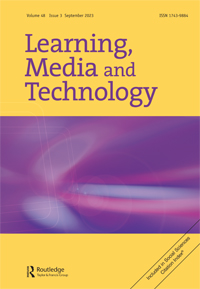教师的技术伦理框架
IF 3.1
1区 教育学
Q1 EDUCATION & EDUCATIONAL RESEARCH
引用次数: 0
摘要
摘要:教师技术伦理框架(TEFT)是为了帮助教育工作者在课堂上选择和使用合乎伦理和教学敏感的教育技术而引入的。TEFT通过三个关键的技术伦理镜头或视角来看待技术:工具、社会材料和存在主义。工具性视角是教师最为熟悉的,它关注的是管理教师和学生使用技术的政策和法律。社会物质视角关注技术的内在偏见,以及它如何以规定的或受限制的方式转化行为。存在主义的视角考虑了学生和教师与技术的纠缠如何影响他们对世界的体验,并改变他们认识、行动、存在和成为的方式。综上所述,这三种方法为教师提供了在课堂上使用技术的道德含义的理论强有力的观点。关键词:技术偏见教育技术后人类教师伦理中小学教育披露声明作者未报告潜在利益冲突。注1课堂实例选自一项对加拿大西部几个城市中心的小学教师使用ClassDojo进行的后现象学研究(Yuen Citation2021),并由作者之一(Adams)监督常识隐私计划(Citation2022)最近对ClassDojo的隐私和数据保护政策给出了82%的评级或“警告”。CommonSense定期对流行的教育应用进行评估和评分,涉及多个“关注类别”,包括儿童安全、隐私和数据安全。它还评估了应用程序对关键法规的遵守情况,如《儿童在线隐私保护法》(COPPA)、《家庭教育权利和隐私法》(FERPA)和《通用数据保护条例》(GDPR)。本研究由阿尔伯塔大学Vargo教学主席资助。本文章由计算机程序翻译,如有差异,请以英文原文为准。
A TechnoEthical Framework for Teachers
ABSTRACTA TechnoEthical Framework for Teachers (TEFT) is introduced to aid educators in selecting and employing educational technologies in ethically sound and pedagogical sensitive ways in their classrooms. TEFT views technology through three key technoethical lenses or perspectives: instrumental, sociomaterial and existential. The instrumental lens is most familiar to teachers and focuses on the policies and laws governing teachers’ and students’ uses of technology. The sociomaterial perspective attends to technology’s built-in biases and how it translates behaviour in prescribed or circumscribed ways. The existential lens considers how students’ and teachers’ entanglements with technology condition how they experience the world and transform their ways of knowing, doing, being and becoming. Taken together, these three approaches provide teachers with a theoretically robust view of the ethical implications of using technology in the classroom.KEYWORDS: Technology biaseducational technologyposthumanteacher ethicsK-12 education Disclosure statementNo potential conflict of interest was reported by the author(s).Notes1 The classroom examples are selected from a postphenomenological study of elementary school teachers using ClassDojo in several Western Canadian urban centres (Yuen Citation2021) and supervised by one of the authors (Adams).2 CommonSense Privacy Program (Citation2022) recently gave ClassDojo a rating of 82% or ‘Warning’ for its privacy and data protection policies. CommonSense routinely assesses and scores popular educational applications across multiple ‘concern categories’ including child safety, privacy and data security. It also rates an app’s compliance with key statutes and regulations such as the Children's Online Privacy Protection Act (COPPA), Family Educational Rights and Privacy Act (FERPA), and General Data Protection Regulation (GDPR).Additional informationFundingThis work was supported by a Vargo Teaching Chair grant, University of Alberta.
求助全文
通过发布文献求助,成功后即可免费获取论文全文。
去求助
来源期刊

Learning Media and Technology
EDUCATION & EDUCATIONAL RESEARCH-
CiteScore
11.40
自引率
14.50%
发文量
53
期刊介绍:
Learning, Media and Technology aims to stimulate debate on digital media, digital technology and digital cultures in education. The journal seeks to include submissions that take a critical approach towards all aspects of education and learning, digital media and digital technology - primarily from the perspective of the social sciences, humanities and arts. The journal has a long heritage in the areas of media education, media and cultural studies, film and television, communications studies, design studies and general education studies. As such, Learning, Media and Technology is not a generic ‘Ed Tech’ journal. We are not looking to publish context-free studies of individual technologies in individual institutional settings, ‘how-to’ guides for the practical use of technologies in the classroom, or speculation on the future potential of technology in education. Instead we invite submissions which build on contemporary debates such as: -The ways in which digital media interact with learning environments, educational institutions and educational cultures -The changing nature of knowledge, learning and pedagogy in the digital age -Digital media production, consumption and creativity in educational contexts -How digital media are shaping (and being shaped by) educational practices in local, national and global contexts -The social, cultural, economic and political nature of educational media and technology -The ways in which digital media in education interact with issues of democracy and equity, social justice and public good. Learning, Media and Technology analyses such questions from a global, interdisciplinary perspective in contributions of the very highest quality from scholars and practitioners in the social sciences, communication and media studies, cultural studies, philosophy, history as well as in the information and computer sciences.
 求助内容:
求助内容: 应助结果提醒方式:
应助结果提醒方式:


